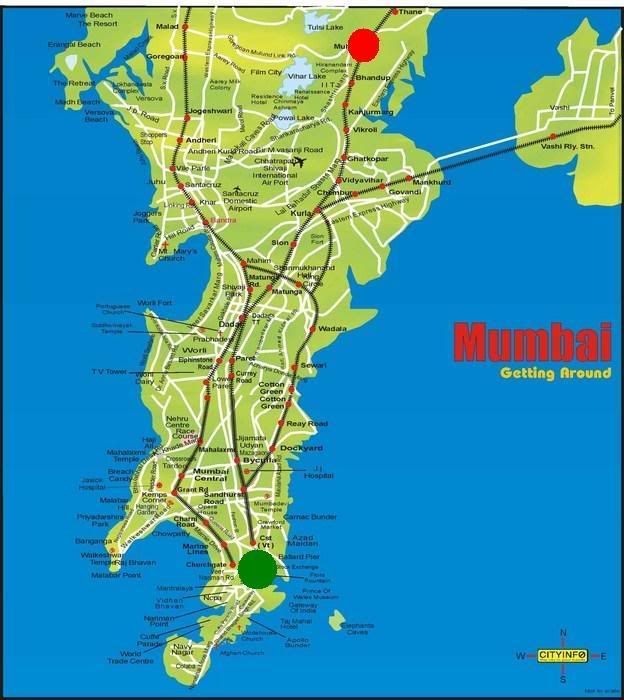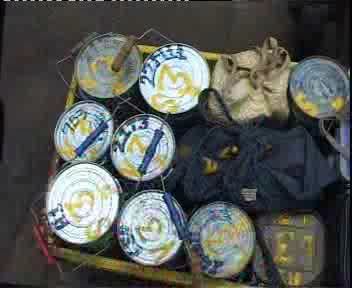Mumbai is considered to a city of dreams. The only difficulty faced here is time. It's really difficult to cope up with time. And so Mumbaikars are very well known for their swiftness. The heart of businesses in Mumbai is its southern part. You must see the influx of people in the mornings into this region. And the biggest problem for the working people is food. They all prefer food which is homemade and hygienic. And this is how the Dabbawallahs come into picture. Many have heard of them. But have you ever thought how they work? Well, here's an insight.....
 To get a better understanding, we'll mark a place here in Mumbai. Let this place be Mulund. You can see it here in the map in the right top corner. Mr.Batliwala(a fictitious name) has his office in Fort(the lower dot). His wife prepares food at around 8 am. And it should reach him before 10:30 am. As she packs the tiffin, the dabbawallah arrives, sharp at 8. The dabbawallah first takes it, along with many dabbas or tiffins to a central area in Mulund which is decided by them. The second dabbawallah takes several such packs of dabbas from other dabbawallahs and takes it to the Mulund railway station.
To get a better understanding, we'll mark a place here in Mumbai. Let this place be Mulund. You can see it here in the map in the right top corner. Mr.Batliwala(a fictitious name) has his office in Fort(the lower dot). His wife prepares food at around 8 am. And it should reach him before 10:30 am. As she packs the tiffin, the dabbawallah arrives, sharp at 8. The dabbawallah first takes it, along with many dabbas or tiffins to a central area in Mulund which is decided by them. The second dabbawallah takes several such packs of dabbas from other dabbawallahs and takes it to the Mulund railway station.






The time is now 8:30. Here with the help of another dabbawallah, he puts all such packages on a cart, and boards it in the next local train towards Mumbai CST. Now, other dabbawallahs already on board receive this cart. As the train moves towards the southern part, the number of such carts increases enormously. And as the train reaches the southern region, the carts reduce one by one as most of the offices are in the south. The train now reaches CST, its final stop. The time is now 9:45. The carts are quickly removed and the packages are sorted according to the areas. The next dabbawallah takes his package and delivers it to that particular area, from where the tiffins are sorted on the basis of their final destination and many other dabbawallahs deliver the tiffins to their respective destinations. And thus, by 10:30 am, Mr.Batliwalla gets his tiffin.
On an average, a tiffin is handled by around eight to ten dabbawallahs on its way. All this sounds really simple, but it's quite difficult considering the transport system and the time. Yet, all this is done everyday without any delay. Based on the location the customers are charged somewhere around Rs.250-300 a month. That is around 7 dollars a month! Be it bright sunlight or a rainy day, dabbawallahs are never deterred.
But did you notice the most important thing? Nothing at all is written, only the tiffin are marked according to their destination. The only so called technology used here is the local train. These dabbawallahs, around 1-2 thousand in number, deliver more than 200,000 tiffins in a day! And that too without any paperwork or the use of computers or mobiles or any damn thing, for that matter. These people illustrate the fact that humans can still be ahead without machines..........
What do you think about this? Do you know any other organisation working with such precision without the use of technology? Please leave your comments......



2 Responses:
Long time back, I heard about the dabbawalas, but now I know how they operate. Interesting post you have here. Keep it up dude!
Yeah, They are very accurate about their work and they really help to Mumbai people.
Add Your Comment >>